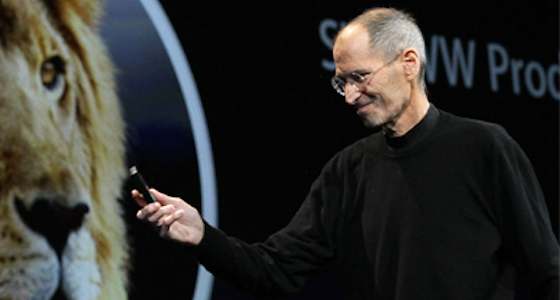- MENU
- HOME
- SEARCH
- WORLD
- MAIN
- AFRICA
- ASIA
- BALKANS
- EUROPE
- LATIN AMERICA
- MIDDLE EAST
- United Kingdom
- United States
- Argentina
- Australia
- Austria
- Benelux
- Brazil
- Canada
- China
- France
- Germany
- Greece
- Hungary
- India
- Indonesia
- Ireland
- Israel
- Italy
- Japan
- Korea
- Mexico
- New Zealand
- Pakistan
- Philippines
- Poland
- Russia
- South Africa
- Spain
- Taiwan
- Turkey
- USA
- BUSINESS
- WEALTH
- STOCKS
- TECH
- HEALTH
- LIFESTYLE
- ENTERTAINMENT
- SPORTS
- RSS
- iHaveNet.com
Todd Wasserman

Steve Jobs is unique for many reasons. One, as Malcolm Gladwell notes in
Outliers: The Story of Success,
is that Jobs has the fortune of being born in 1955 -- the same year as Bill Gates -- so he was in his early 20s when
the PC revolution hit.
But it's not just luck that helped Jobs reach the top. Aside from his abundant gifts (an eye for design, an intelligence that can't be discounted), he followed five secrets of success at every step of his career. Here's what they are:
1. Embrace failure.
Getting fired is bad enough, but imagine getting fired from the company you created. That's what happened to Steve Jobs in 1985. Yet leaving Apple then turned out to be one of the best things that ever happened to him. "He had no management skills before he left," says Tim Bajarin, president of Creative Strategies, who has been tracking Jobs' career since 1977. "He had a very abrupt style. It was his company, and he sought perfection."
His 11 years of running NeXT Computer and Pixar after leaving Apple gave him a crash course in running a company. And consumers' tepid response to NeXT gave him a better sense of where the real market opportunities were. So when he returned to Apple in 1996, at 30 years old, Jobs was standing on the threshold of success.
2. Be focused.
We all set goals, but we also often let ourselves off the hook when we get distracted or our goal becomes too difficult. Not Steve Jobs. "He knows what he wants to do, and he sets up everything in life to achieve those goals," says Bajarin.
For instance, Apple has a relatively small product line for such a large company. "Certainly the great consumer electronics companies of the past had thousands of products," Jobs said in a 2008 interview with Fortune magazine. "We tend to focus much more. People think focus means saying yes to the thing you've got to focus on. But that's not what it means at all. It means saying no to the hundred other good ideas. You have to pick carefully."
3. Pursue your passions, even if they seem impractical.
In his commencement speech to Stanford University in 2005, Jobs discussed how he dropped out as an undergrad but stayed at Reed College to check out classes he was interested in. One interest was calligraphy. Even though it had no seeming practical application, Jobs learned the art anyway. It wasn't until 10 years later that he applied those skills to the first Mac, which sported beautiful typefaces.
4. Be insistent.
If you believe in what you're doing, don't give up. Rob Enderle, president and principal analyst of the Enderle Group, disputes the commonly held notion that Jobs is two or three steps ahead of the market. "He drives the market to where he's thinking," says Enderle. "If you can drive the market to a future you would like, you can be incredibly accurate in your predictions."
5. Don't be afraid of confrontation.
Jobs' anger is the stuff of legend. A recent anecdote, relayed in a Fortune article, illustrates the convergence of his aforementioned traits: After the failure of MobileMe in the summer of 2008, Jobs gathered the MobileMe team and asked, "Can anyone tell me what MobileMe is supposed to do?" When no one responded, he continued, "So why the f--- doesn't it do that?" Then, he berated them further: "You should hate each other for having let each other down." Jobs capped off the meeting by naming a new executive to run the group.
No doubt, many of those types of ugly scenes played out in Cupertino over the years to produce some of Apple's seamless products. Enderle says that Jobs's cruelty in those situations was driven by a deep insecurity. But you also could argue that without that seeming insecurity, Jobs would never have made Apple into the company it became.
The real challenge is this: When you're the boss, you always have to calculate whether to be a nice guy or a strong leader, and often we try to do both. But if you really want to be like Steve Jobs -- and leave behind the legend that he did -- you might ultimately have to decide that being a nice guy is overrated.